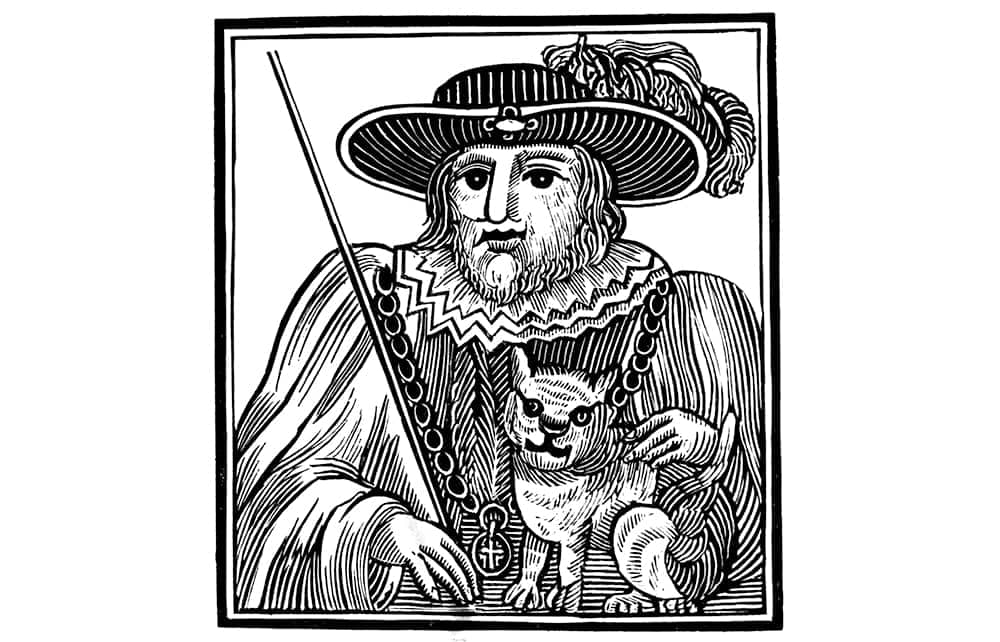In that dark world the air pulsed with the melancholy clangour of bells. If, as legend has it, the chimes of St Mary-le-Bow told Dick Whittington to turn again, then what were they saying to all the other medieval Londoners, dwelling in houses so crowded on fouled streets that the sun could not break through?
In the shadow of implacable plague, even London’s super rich were piercingly aware of life’s fragility. Their homes were scented with lily, lavender and the smoke of applewood. They had to be. The city was a close maze of abattoirs and tanneries and streams sluggish with excrement. Yet here, too, were brightly ornamented religious houses and gardens rich with symbolism and medicinal herbs. Then there was the irresistible gravity of the Thames, which rolled out to the wider world and the immense spoils of continental commerce, which in turn were financing the throne. Here was a vortex of history, at the centre of which stood a most remarkable mayor.
The subject of one of London’s most potent myths, as Michael McCarthy grippingly explores, was in fact a very serious merchant oligarch – which makes him rather more emblematic of London than the pantomime hero. Richard Whittington had a sincere, philanthropic side: prison reform and the endowment of charitable establishments. But it was his money that proved one of the vital hidden engines of medieval English history, bankrolling the ‘damasks and silks’ of Richard II, the even more luxurious excesses of Henry IV, and finally Henry V’s victory at Agincourt in 1415.
Whittington bankrolled the excesses of Richard II and Henry IV – and finally Henry V’s victory at Agincourt
In 17th-century chapbooks and later pantomimes, Dick Whittington is an allegorical figure of social mobility: the poor boy with a cat who rises to mayoral exaltation. The truth, as McCarthy compellingly conveys, is more a story of advantageous family ties, ice-cool intelligence, unceasing application and astounding shrewdness in an age of lethal political turbulence. In a sense, Whittington, four times mayor, was the Deep State of the 1400s, and McCarthy has done a wondrous, exquisitely detailed job of piecing together the fragments of that life that remain.
Born c. 1358 in a manor house at Pauntley, near Gloucester, the baby Whittington, son of Sir William and Joan, entered a world that had been virtually emptied by the Black Death. Aged about 11, his father having died, the boy was sent by his mother to a grand London home called Leadenhall, to be apprenticed to Sir Ivo Fitz Warin, a young landowner, royal favourite and family friend
McCarthy is mesmerising in conjuring this transformative journey: the shape and economics of the countryside (when wool, for export, was ‘sheep’s gold’), the arrival to the cacophony of a gated medieval city and the subsequent duties of apprenticeship to this young master, which threw the adolescent Whittingdon headlong into the customs of commerce. London seemed a realm apart, with its own circles of mercantile power: victuallers, grocers, brewers and mercers. The streets of the late 14th century were, much as now, filled with fast-food outlets: ‘From cook shops would arise the aroma of pain de mayne and the tang of rye.’
Merchant adventurers were finding new markets as far afield as Russia. London’s wharfs welcomed wines and silks from Venice and Genoa. There were also early property developers, demolishing tenements and building new luxurious houses of brick and timber. As a mercer, Whittington was deeply involved in the mighty wool trade, the continental appetite for English wool being voracious.
His most agile insight concerned maintaining liquidity; and thus it was, as his easy-to-access riches accumulated, successive kings sought loans – which were frequently paid back in terms of sinecures and business opportunities. What was even more impressive was that, having been close to Richard II, Whittington survived the king’s deposition by Bolingbroke and indeed was even more in demand thereafter. (It helped that Whittington had also previously made loans to the young Bolingbroke.) He was also ‘exceptionally discreet’, and wise with his growing power. When the mayoralty was bestowed upon him he demonstrated passionate opposition to old corruption and monopolistic interests and brought new order to the city.
There are also moments when McCarthy explores the extraordinary internationalism of London in the early 1400s, including Whittington’s persuasion of the king to allow him to engage the Jewish apothecary Master Thomas Sampson of Mirabeau to attend his ailing wife Alice. (After their expulsion in 1290, Jews were forbidden to live in England.)
Here really is a fable of London’s early capitalism, which at times seems startlingly modern. Whittington, who lived into his sixties, was sinuous about the accommodations the rich must make with the state; about camouflaging their power through genuflection; and about fulfilling their obligations to the wider society they helped shape.






Comments